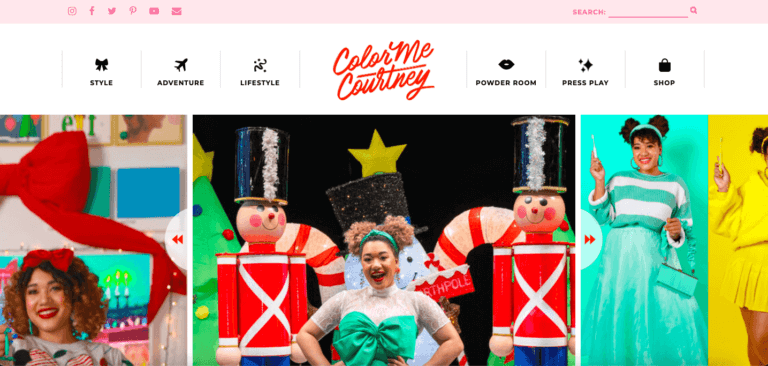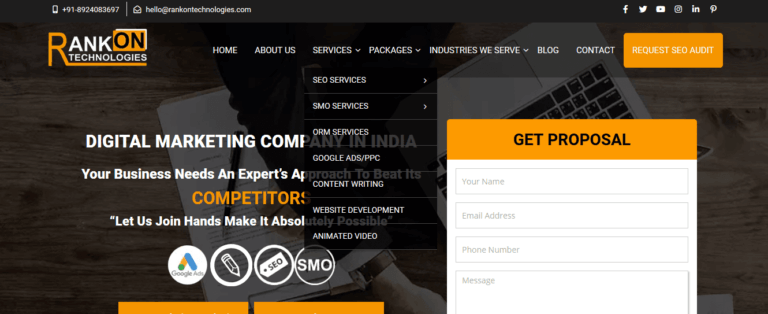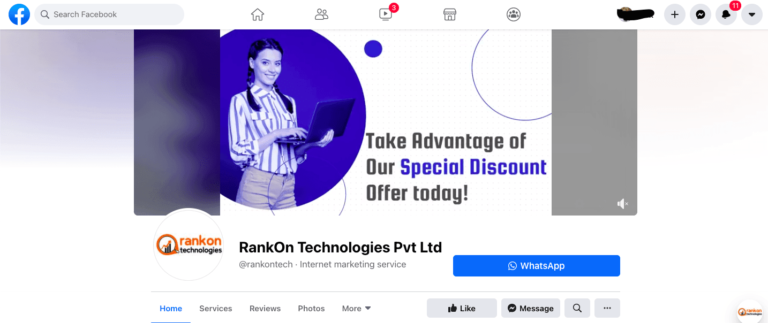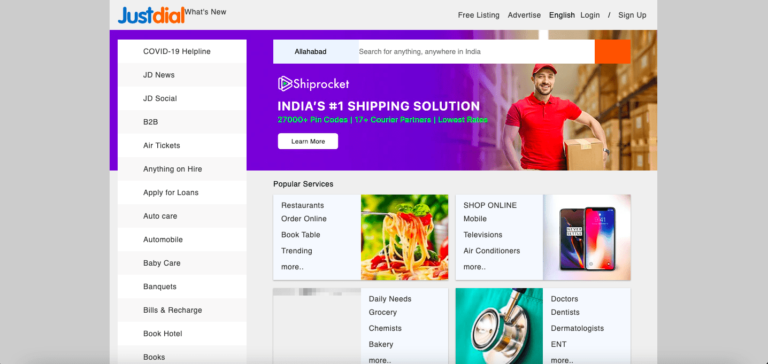Do you want to build a website but are not sure what type of website you actually want what are the different types of websites you can opt for as per your business need? Don’t worry, read this post and you will be educated enough to select the right type of website for your business.
Table of Contents
What is a Website?
A website is a collection of web pages and related content that are accessible through a common domain name on the internet. It is typically hosted on a web server and can be accessed using a web browser. Websites can serve various purposes, such as providing information, offering products or services, facilitating communication, or entertaining users.
A website consists of individual web pages that are interconnected through hyperlinks, allowing users to navigate between different pages and access various types of content, such as text, images, videos, audio, and interactive elements. Websites can be static, with fixed content that doesn’t change frequently, or dynamic, where content is generated or updated dynamically based on user interactions or data inputs.
Websites are built using web technologies such as HTML (Hypertext Markup Language), CSS (Cascading Style Sheets), and JavaScript, along with server-side programming languages like PHP, Python, or Ruby, depending on the specific requirements of the website. Content management systems (CMS) like WordPress or Drupal are often used to simplify the process of creating and managing website content.
Overall, a website serves as a platform for individuals, businesses, organizations, or communities to establish an online presence, share information, interact with users, conduct transactions, and achieve various goals on the internet.
Not Sure What Type Of Website Is Suitable for Your Business? Contact us!
Before You Plan To Build A Website For Your Business, Decide On What Type Of Website Design Will Work To Suit Your Needs.
For This, You Need To Be Thoughtful About Your Business Purposes, Objectives, Nature, And Of Course Requirements.
Types Of Websites
The selection of an appropriate website design would help in appropriately conveying the message you want to get delivered from your website and it will also control the website development cost. Hence, the right website design is the key to gain outcomes from your business website.
As a website development company, we have created so many different types of websites with different design layouts and features that make a great website. Most of our website development clients with appropriate website layouts have experienced tremendous outcomes. If you also want a perfect website that can help to fulfill your needs, then this blog is for you!
Websites can be broadly classified into two categories based on their content and functionality: static websites and dynamic websites.
Static Websites: Static websites are composed of fixed, pre-built web pages that remain unchanged unless manually updated by a web developer. They are typically built using HTML and CSS and do not involve complex server-side processing or databases. Static websites are suitable for simple online brochures, portfolios, or informational sites where content doesn’t require frequent updates. Examples include basic business websites, personal blogs, and landing pages.
Dynamic Websites: Dynamic websites are built using server-side scripting languages, such as PHP, Python, or Ruby, and are driven by a content management system (CMS) or a database. These websites generate web pages on the fly, allowing for more interactive and personalized content. Dynamic websites can store and retrieve data, handle user authentication, and offer features like e-commerce functionality, user forums, or user-generated content. Examples include e-commerce platforms, social networking sites, online forums, and news portals.
Dynamic websites separate content from presentation, enabling easy updates and modifications. Content can be added, edited, or removed dynamically without manually modifying individual web pages. This flexibility makes dynamic websites more scalable and adaptable for websites that require frequent content updates or user interactions.
Different Types of Websites
From personal endeavors to business ventures, there is a wide range of website types available. In this section, we will explore and provide a brief overview of different types of websites, along with their applications and significance in the online world.
- Ecommerce Website: An ecommerce website is an online platform that enables the buying and selling of products or services over the internet. These websites typically include features such as product catalogs, shopping carts, secure payment gateways, and order processing systems. Ecommerce websites have revolutionized the way we shop, allowing businesses to reach a global audience and customers to enjoy convenient online shopping experiences.
- Business Website: Business websites serve as digital storefronts for companies, providing information about products, services, and contact details. They often include sections about company history, mission statements, team members, and testimonials. Business websites enhance brand visibility, credibility, and act as a valuable marketing tool.
- Blog Website: Blog websites are platforms where individuals or organizations share articles, opinions, and insights on various topics. They offer regular updates in a chronological order and provide opportunities for readers to engage through comments and social sharing. Blogs are ideal for content creators, journalists, influencers, and businesses seeking to share expertise, build a community, or drive traffic to their websites.
- Portfolio Website: A portfolio website showcases an individual’s or a company’s work, accomplishments, skills, and creative projects. It serves as a visual representation of their capabilities and expertise, making it particularly valuable for freelancers, artists, designers, photographers, and agencies looking to impress potential clients or employers.
- Event Website: Event websites are designed to promote and manage specific events, such as conferences, festivals, concerts, or corporate gatherings. They provide information about event details, schedules, speakers, ticketing options, and registration processes. Event websites streamline event organization and enhance attendee engagement.
- Personal Website: Personal websites are online platforms that individuals create to represent themselves professionally or personally. They allow individuals to showcase their work, share their thoughts, build their personal brand, or connect with like-minded people. Personal websites are valuable for professionals, freelancers, and individuals in creative fields.
- Membership Website: Membership websites restrict access to specific content, resources, or services to registered members. They often require users to create accounts, sign in, and may offer different membership levels with varying privileges. Membership websites are commonly used by associations, educational platforms, subscription-based services, and online communities.
- Nonprofit Website: Nonprofit websites represent charitable organizations and serve as digital hubs to raise awareness, share missions, accept donations, and engage volunteers. They highlight the organization’s goals, impact, and provide transparency regarding the allocation of funds. Nonprofit websites play a vital role in fundraising and mobilizing support for worthy causes.
- Informational Website: Informational websites provide factual and educational content on specific topics, industries, or subjects. They focus on delivering accurate information, explanations, guidelines, and resources to educate the audience. Informational websites are commonly used by government agencies, educational institutions, research organizations, and knowledge-sharing platforms.
- Online Forum: Online forums are platforms where users can engage in discussions, ask questions, and share knowledge on specific topics. They facilitate conversations among like-minded individuals, fostering community building and information exchange. Online forums are widely used in niche industries, hobbyist groups, and support communities.
- Community Website: Community websites are digital spaces where people with shared interests, values, or goals come together. They enable members to interact, collaborate, and participate in various activities. Community websites can focus on hobbies, professional networks, social causes, or geographic locations, creating virtual communities that foster connections and engagement.
- Startup Website: Startup websites are developed by emerging businesses to introduce their innovative products, services, or concepts to the market. They often highlight the value proposition, target audience, and unique features of the startup. Startup websites are crucial for attracting investors, gaining early adopters, and establishing a strong online presence.
- Consulting Website: Consulting websites represent consulting firms or individual consultants, showcasing their expertise, services, and success stories. They aim to attract potential clients by providing valuable insights, case studies, and testimonials. Consulting websites help establish credibility, demonstrate thought leadership, and generate leads.
- Booking Website: Booking websites provide a platform for users to reserve or book services, such as hotel accommodations, flights, rental cars, or appointments with professionals. They typically offer real-time availability, pricing, and secure payment options. Booking websites streamline the reservation process and enhance customer convenience.
- Petition Website: Petition websites enable individuals or organizations to gather support and signatures for specific causes, issues, or campaigns. They provide a platform for people to express their opinions, create awareness, and promote social change. Petition websites are powerful tools for activism, advocacy, and mobilizing public support.
- School Website: School websites represent educational institutions, providing information about programs, faculty, admissions, events, and resources for students, parents, and staff. They play a crucial role in communication, enhancing transparency, and showcasing the school’s values and achievements.
- Hobby Website: Hobby websites are dedicated to specific hobbies or interests, providing information, tutorials, resources, and a platform for enthusiasts to connect. They cater to various hobbies, such as cooking, gardening, photography, crafts, and sports. Hobby websites foster communities and enable knowledge sharing among passionate individuals.
- Interactive Website: Interactive websites engage users through dynamic and immersive experiences. They incorporate features like quizzes, games, interactive maps, virtual tours, or personalized content. Interactive websites aim to captivate visitors, increase engagement, and provide memorable user experiences.
- Entertainment Website: Entertainment websites offer various forms of entertainment, such as movies, music, videos, games, or celebrity news. They serve as platforms for entertainment companies, artists, and content creators to share their creations, engage with fans, and provide a source of enjoyment.
- Wedding Website: Wedding websites are created by couples to share information about their upcoming weddings, including venue details, RSVPs, registries, and photo galleries. They serve as digital invitations and provide a central hub for guests to access important wedding-related information.
- Travel Website: Travel websites offer information, booking options, and resources related to travel destinations, accommodations, transportation, and activities. They enable users to research, plan, and book their travel arrangements conveniently. Travel websites cater to both leisure and business travelers, providing essential information and facilitating seamless travel experiences.
- Directory Website: Directory websites compile and organize information about businesses, professionals, organizations, or specific categories. They often provide search functions, reviews, and ratings to help users find the services they need. Directory websites serve as valuable resources for users seeking local or specialized businesses.
- Landing Page Website: Landing page websites are designed for specific marketing campaigns or promotions, aiming to capture leads or encourage specific actions from visitors. They often have a focused design, persuasive copy, and call-to-action buttons to drive conversions. Landing pages are commonly used in digital advertising, email marketing, or product launches.
- News and Magazine Website: News and magazine websites publish articles, news stories, features, and editorials on a wide range of topics. They offer timely information, analysis, and opinions to keep readers informed and engaged. News and magazine websites may focus on general news or niche topics, catering to diverse readerships.
- Memorial Website: Memorial websites are created in memory of loved ones who have passed away. They serve as online tributes, providing a space for sharing memories, photos, and messages of remembrance. Memorial websites offer solace and allow friends and family to honor and cherish the memory of their loved ones.
- Subscription Website: Subscription websites offer exclusive content, services, or products to subscribers who pay a recurring fee. They often provide gated access, member-only benefits, or premium features. Subscription websites can include online courses, premium content platforms, or product subscription services.
- Kid-Friendly Website: Kid-friendly websites are designed with child safety and age-appropriate content in mind. They offer educational resources, games, interactive activities, and entertainment suitable for children. Kid-friendly websites ensure a secure and enriching online experience for young users.
Types of websites according to the software used
Websites can be classified based on the software or technologies used to build and manage them.
Here are some types of websites categorized by the software or technologies employed:
- HTML/CSS Websites: These websites are built using HTML (Hypertext Markup Language) and CSS (Cascading Style Sheets) as the primary languages. They are static websites that present fixed content and have limited interactivity.
- Content Management System (CMS) Websites: CMS websites are built using CMS platforms like WordPress, Drupal, Joomla, or Wix. These platforms provide pre-designed templates and a user-friendly interface for content creation, management, and customization. They offer dynamic and interactive features, allowing users to update and publish content without extensive technical knowledge.
- E-commerce Platforms: E-commerce websites utilize specialized software or platforms dedicated to online selling. Examples include Magento, Shopify, WooCommerce (built on WordPress), and BigCommerce. These platforms offer features like product catalogs, shopping carts, secure payment gateways, and inventory management systems.
- Framework-based Websites: Frameworks like Laravel, Ruby on Rails, Django, or ASP.NET provide a foundation for building dynamic and scalable websites. They offer a set of libraries, tools, and structures to facilitate web development, database integration, and complex functionality implementation.
- JavaScript-based Websites: JavaScript frameworks and libraries like React.js, AngularJS, Vue.js, or Node.js enable the development of highly interactive and responsive websites. They allow for real-time updates, dynamic content rendering, and smooth user experiences.
- Custom-built Websites: Some websites are developed from scratch using programming languages like PHP, Python, Ruby, or Java. These websites provide complete control over design, functionality, and customization, tailored to specific project requirements.
It’s worth mentioning that websites can also utilize a combination of these technologies. For example, a CMS website may incorporate custom HTML/CSS elements or JavaScript functionalities to extend its capabilities.
Choosing the appropriate software or technology for your website depends on factors such as your project requirements, scalability needs, development expertise, and desired functionality. It’s advisable to consider consulting with a web developer or a digital agency to determine the most suitable software and technology stack for your specific website project.
Business Appropriate Types of Websites

If choosing the right website design seems an uphill task for you, then no need to take the stress! We’ve here put-together different types of websites varying in layout and design. Dive in the points below to know about them in detail!
Benefits of Static Websites
Static websites offer several benefits, especially for specific use cases.
Here are some advantages of static websites:
- Simplicity and Speed: Static websites are built with simple HTML and CSS files, which makes them lightweight and fast to load. They don’t require server-side processing or database queries, resulting in quick page rendering and improved performance. This can enhance user experience, particularly for visitors with slower internet connections or limited bandwidth.
- Security: Static websites are inherently more secure compared to dynamic websites. Since they do not rely on server-side scripting or database interactions, there are fewer vulnerabilities for potential attacks. Additionally, there is no risk of exposing sensitive server-side information or database vulnerabilities.
- Cost-Effectiveness: Static websites are often less expensive to develop and host compared to dynamic websites. They require minimal server resources and can be hosted on inexpensive hosting plans or even free hosting services. Moreover, their simplicity reduces the need for ongoing maintenance, lowering long-term costs.
- Reliability and Stability: Static websites are not dependent on server-side processes or external dependencies, making them more reliable and stable. They are less prone to downtime, server errors, or compatibility issues with updates or plugins since the content is already generated and stored as static files.
- Better SEO Performance: Static websites can be optimized for search engines more effectively. With clean and simple HTML markup, relevant meta tags, and well-structured content, it becomes easier for search engines to crawl and index the website’s pages. This can potentially lead to improved search engine rankings and visibility.
- Version Control: Since static websites are made up of individual files, version control systems (e.g., Git) can be used to track changes, collaborate with others, and roll back to previous versions if needed. This facilitates efficient website management, updates, and collaboration among developers.
- Scalability: Static websites can handle high levels of traffic without performance degradation. The absence of server-side processing and database queries allows them to serve a large number of simultaneous requests efficiently, making them suitable for websites with predictable or intermittent traffic spikes.
While static websites may not be suitable for every scenario, they provide distinct advantages in terms of simplicity, speed, security, and cost-effectiveness. They are particularly beneficial for websites with basic content that doesn’t require frequent updates or interactive functionality.
Benefits of dynamic websites
Dynamic websites offer numerous benefits and advantages over static websites.
Here are some key benefits of dynamic websites:
- Interactive and Engaging Content: Dynamic websites allow for interactive and engaging content that can be personalized based on user preferences and actions. With dynamic scripting languages like PHP, Python, or JavaScript, dynamic websites can incorporate features such as user registration, login systems, comments sections, feedback forms, and dynamic content generation based on user input.
- Content Management Systems (CMS): Dynamic websites often utilize CMS platforms like WordPress, Drupal, or Joomla, which provide user-friendly interfaces for managing and updating website content. CMS allows non-technical users to easily create, edit, and publish content, reducing the reliance on web developers for routine updates.
- Data-Driven Functionality: Dynamic websites can integrate databases to store and retrieve information, enabling advanced functionality. This includes features like product catalogs with search and filtering capabilities, e-commerce functionality, user-generated content, user profiles, and personalized recommendations based on user behavior.
- Scalability and Flexibility: Dynamic websites are highly scalable and can handle large amounts of data and high traffic volumes. They can easily adapt to evolving business needs, accommodate growth, and incorporate new features without significant architectural changes.
- Enhanced User Experience: Dynamic websites offer personalized and tailored experiences for users. Content can be dynamically generated and customized based on user preferences, location, previous interactions, or other parameters. This helps create a more engaging and relevant experience, leading to increased user satisfaction and retention.
- SEO Optimization: Dynamic websites offer more opportunities for implementing effective search engine optimization (SEO) strategies. With dynamic content, meta tags, customizable URLs, and the ability to generate SEO-friendly pages, dynamic websites can improve their visibility and ranking on search engine result pages.
- Real-Time Updates: Dynamic websites can display real-time information and updates, making them ideal for websites that require frequent content changes, such as news portals, social media platforms, and online marketplaces.
- Integration with Third-Party Services: Dynamic websites can easily integrate with external APIs and services, allowing seamless integration with payment gateways, social media platforms, analytics tools, email marketing services, and more.
Dynamic websites offer a high level of interactivity, personalization, and flexibility, making them suitable for websites that require advanced functionality, frequent content updates, and a more interactive user experience.
What type of website is best for me?
Determining the best type of website for you depends on several factors, including your goals, requirements, target audience, and the nature of your content or business.
Here are some questions to consider that can help guide you in choosing the most suitable type of website:
- What is the purpose of your website? Are you looking to sell products or services, share information, build an online community, or showcase your portfolio?
- Do you need interactive features and user engagement? Are you planning to incorporate user registration, comments sections, forums, or other interactive elements?
- How frequently will you update the content on your website? Do you need a system that allows easy content management and updates by non-technical users?
- Do you have a product catalog and need e-commerce functionality, or will you be primarily providing informational content?
- Are you planning to generate revenue from your website through advertisements, subscriptions, or online transactions?
- Are you targeting a specific niche or industry? Do you need features or functionalities specific to that industry (e.g., online bookings for a travel website)?
- Do you require integration with third-party services or APIs, such as payment gateways, social media platforms, or analytics tools?
- How much technical expertise or resources do you have for website development and maintenance?
Considering these questions can help you identify the primary purpose and features you need in a website. It may be helpful to consult with a web developer or digital agency to discuss your specific requirements and get professional advice on the most suitable type of website for your needs.
Different Types of Websites
Types of Websites can be categorized into various types based on their purpose, functionality, and content. Here are some common types of websites:

Image Source: https://www.magzter.com/
Magazine Websites
Magazine websites are just the digital form of conventionally used magazines. It incorporates informational videos, articles, and photos.
Once you plan to create a magazine site, make sure you have an idea of its outline. Also, ensure the design should always remain intact, no matter what day the user visits the website.

Image Source: pashmin.in
E-Commerce Websites
These websites are designed for online businesses to sell products or services directly to customers. They include features like product listings, shopping carts, payment gateways, and order management systems.
An E-commerce website serves as a platform for buying and selling products digitally. There are various features on the e-commerce website like payment gateway, add to cart option, etc.
Some of the most popular e-commerce websites include Amazon, Flipkart, Nykaa, etc. There are various content management softwares like Shopify, WordPress, SquareSpace to create well-crafted e-commerce websites.
As a website development company, we have developed some of highly dynamic and innovative e-commerce websites.
Recommended Reading: Benefits of Having a Business Website

Image Source: https://www.colormecourtney.com/
Blog Websites
Blogs are platforms where individuals or organizations share articles, opinions, and information on various topics. They often allow readers to leave comments and engage in discussions.
A blog is one of the types of website that incorporates informational content like articles and blogs. If you like to curate quality content that can some or the other way help the reader, then you should get a blog website designed.
It is a dynamic form of a website that shows the content in the reverse chronological order where newer content and appears on the top and the older content gets down. As a website development company, we have helped many bloggers to showcase their writings to the world through a stunning blogging website.

Home Pages
The home page is the central page of any website. It constitutes links to all other pages of the website. It forms the identity of your business in the digital world.
Although the homepage can be designed in a variety of styles using a range of layouts, it should work to propagate the Unique Selling Proposition of your business creatively.
As a website design company, we have developed many websites with spectacular homepages. We pay careful consideration of the minutiae of the homepage design that includes clearly visible links to relevant webpages, suitable graphics, proper structure, call-to-action, and a lot of things more!

Image Source: https://www.adrienloret.fr/
Portfolio Websites
Portfolio websites showcase the work, skills, and accomplishments of individuals or creative professionals like artists, photographers, designers, and writers. They typically feature a collection of projects or samples.
Best for artists! Such types of websites can help you to showcase your best work to the entire world. No matter you’re a painter, photographer, wedding planner, or interior designer, you can put your best foot forward through a portfolio website.
Artists always search for a platform to bring forth their talent in the audiences’ eye. If you’re one such artist, you can get a portfolio website developed to showcase your artwork.

Image Source: https://www.facebook.com/rankontech/
Social Media Websites
Another type of website is a Social Media Website. It is a social platform where people virtually meet one another. Some of the social media websites include Facebook, Snapchat, Instagram, and LinkedIn.
Social networking websites enable users to connect, communicate, and share content with others. Examples include Facebook, LinkedIn, Twitter, and Instagram.
If you’re willing to get a social media website created for your business, then make sure it has an easy to traverse and easily understandable layout.
Also Check : How To Promote A Facebook Business Page?

Landing Pages
A landing Page is a standalone web page that is specifically created to support an advertising or marketing campaign. The purpose of a landing page is to impel a visitor to take some action by clicking on a CTA button. It consists of a limited amount of content written strategically to convert a visitor to a potential customer. If you’re running any marketing campaign, then straightway contact Rankon Technologies to get a business website developed.

Image Source: https://www.justdial.com/
Directory And Contact Pages
A directory is a type of website that consists of information of a single section of the community. For Example: The information and specialization of all the Dentists, Doctors, Building Contractors in the City, etc.
Website Maintenance for different types of websites
Website maintenance is essential for keeping your website secure, up to date, and functioning optimally. While specific maintenance tasks may vary depending on the type of website, here are some general maintenance considerations for different types of websites:
- E-commerce Websites:
- Regularly update product listings, prices, and descriptions.
- Test and ensure that the shopping cart and payment gateway are working properly.
- Monitor inventory levels and update as necessary.
- Conduct security audits and ensure secure transactions.
- Implement and update SSL certificates for secure connections.
- Regularly backup customer and transaction data.
- Blogging Websites:
- Publish new content regularly to keep readers engaged.
- Monitor and moderate user comments and interactions.
- Check for broken links and fix them.
- Optimize the website for search engines.
- Update and patch blogging platform or CMS to the latest version.
- Monitor website traffic and user engagement using analytics tools.
- Portfolio Websites:
- Update portfolio with new projects, work samples, or achievements.
- Optimize images and multimedia for faster loading times.
- Review and refresh the design periodically to keep it visually appealing.
- Test website functionality and ensure smooth navigation.
- Social Networking Websites:
- Monitor and moderate user-generated content and interactions.
- Regularly update privacy settings and security measures.
- Implement user authentication and access control.
- Optimize database performance to handle increasing user data.
- Test and optimize website performance for high user loads.
- News and Media Websites:
- Publish fresh content frequently to keep visitors informed.
- Implement a content scheduling system to ensure regular updates.
- Optimize website speed for quick loading of articles and multimedia.
- Monitor and fix broken links and images.
- Implement caching mechanisms to handle high traffic during peak times.
- Educational Websites:
- Regularly update educational content and resources.
- Review and refresh courses, tutorials, or learning materials.
- Test online quizzes or assessments for accuracy and functionality.
- Ensure accessibility and usability for a diverse range of learners.
Regardless of the type of website, general maintenance tasks include
- Regular backups of website files and databases.
- Monitoring website security and applying security patches.
- Testing website functionality across different devices and browsers.
- Checking for broken links or error pages.
- Updating software, plugins, and themes to the latest versions.
- Optimizing website performance for fast loading times.
- Monitoring website analytics and user engagement metrics.
It’s important to note that the specific maintenance requirements for your website may vary depending on its complexity and unique features. Regularly reviewing your website’s performance, security, and user feedback can help identify specific maintenance needs and ensure your website remains in optimal condition.
Community Forums:
These websites allow users to participate in discussions, ask questions, and share information within specific interest-based communities.
Government Websites
Government websites provide information, services, and resources related to government departments, agencies, and public services.
Nonprofit Websites:
Nonprofit organizations use these website for NGO to raise awareness, share their mission, and collect donations for charitable causes.
Personal Websites:
Nonprofit organizations use these website for NGO to raise awareness, share their mission, and collect donations for charitable causes.
Wiki Websites
Wiki websites allow collaborative editing and content creation by multiple users. Wikipedia is a well-known example of a wiki-based website.
These are just a few examples, and websites can overlap or combine multiple types depending on their specific goals and functionalities.

So, these were the different types of websites that are created commonly. If you think any of the following websites can work to fulfill your business purposes, then contact Rankon Technologies.
RankON Technologies is a leading website development company in India. Visit our website development packages for more details.
Frequently Asked Questions
These FAQs cover some of the common questions related to different types of websites. The answers provide a general understanding of the respective website types.
A static website is a type of website that contains fixed content and doesn’t require frequent updates. It presents consistent information to visitors and typically doesn’t have interactive features or dynamic content generation.
A dynamic website is a type of website that generates content dynamically, usually based on user interactions or real-time data. It can have interactive features, user registration systems, content management systems, and more.
An e-commerce website is a type of website that is specifically designed for online buying and selling of products or services. It includes features like product catalogs, shopping carts, secure payment gateways, and inventory management.
A CMS website is a website built using a content management system platform like WordPress, Drupal, or Joomla. These platforms provide user-friendly interfaces for creating, editing, and managing website content without extensive technical knowledge.
A blogging website is a type of website where individuals or businesses regularly publish articles, stories, or updates on various topics. It often includes features like comments sections, social sharing buttons, and categorization of blog posts.
A portfolio website is a website that showcases the work, projects, or accomplishments of an individual or a company. It typically includes examples of work, client testimonials, and contact information.
A social networking website is an online platform that allows individuals to connect, interact, and share content with others. Examples include Facebook, LinkedIn, and Twitter.
An educational website is a website that provides educational content, courses, tutorials, or resources to facilitate learning. It can cater to various subjects, age groups, or specific educational goals.
An online marketplace website is a platform where multiple sellers can offer products or services to potential buyers. Examples include Amazon, eBay, and Etsy.
A news and media website is a website that provides news articles, reports, or multimedia content to keep readers informed about current events, specific topics, or industry updates.












